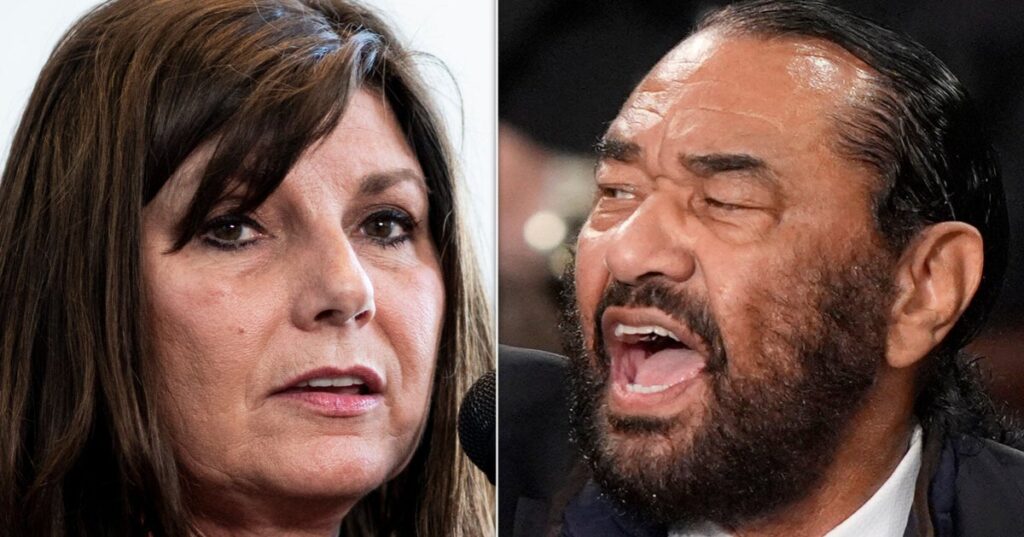Rep. Diana Harshbarger (R-Tenn.) has come under fire for referring to Rep. Al Green as “boy” during a recent interview where she was harshly criticizing him.
The congresswoman had joined a sit-down conversation with a Christian media platform called F.A.M.E. Ministries to discuss faith and politics last week. Toward the end of the nearly 40-minute conversation posted on YouTube, Harshbarger talked about members of Congress, saying there are “good” and “Godly” people in Congress, like her, and that she works to block out the “noise” while on the job.
The host later asked about members not getting along, before he referenced President Donald Trump’s address to Congress in March, and Democrats holding up signs and exercising other forms of protest against the administration.
Harshbarger then mentioned Green, who was escorted from the House chamber after he rose from his seat, held up his cane and yelled in protest as Trump spoke: “You have no mandate to cut Medicaid!”
“Al Green was over here with his cane,” Harshbarger said as she waved her arm. “And I was like, ‘Gosh dangit, boy, put that’ — he does not need that cane. That cane is a prop. I swear it’s not real.”
She then said that one of her colleagues said: “Screw the gold part off of it, see if there’s a gun in there.”
“I don’t know about that man,” Harshbarger continued. “He’s just … weird Al.”
Harshbarger, who is white, was criticized on X, formerly Twitter, for referring to Green — a Black adult 77-year-old man — as “boy,” given the word’s racist connotation and history in the U.S. During slavery, in the Jim Crow era and beyond, white people would call Black men, regardless of their age, “boy,” as way to dehumanize and humiliate them. Some civil rights leaders have even referred to the term as a “close cousin” of the N-word.
A representative for Harshbarger did not immediately return a request for comment.
Shaun Harper, a professor of public policy, education and business at the University of Southern California, thinks it’s embarrassing for Harshbarger that she used such an offensive loaded term as a public leader.
“Hopefully, Harshbarger isn’t running around Tennessee calling the Black men who voted for her and others whom she’s been elected to serve ‘boy,’” Harper, an expert in racial equity, told HuffPost. “If so, perhaps they should think twice before reelecting someone who knows so little about expressions that were used to denigrate and terrorize many of their fathers and grandfathers in prior eras.”
Harshbarger’s remarks remind us why Trump’s crusade against curriculum on race and history in schools is concerning.
Trump has ordered K-12 schools using federal money to end any diversity, equity and inclusion initiatives. He’s also ordered U.S. schools to stop teaching what he calls “critical race theory.”
Harper said that these legislative actions on the teaching of America’s racial past could cause many school-aged children today to “transition into adulthood without ever being taught why calling a Black man ‘boy’ is offensive — at times racist.”
“If they don’t learn this at school or at home, how else will they know?” he said.
And Harper also emphasized that Harshbarger’s comments casting doubt on Green’s use of a cane were ableist — and riddled with implicit bias.
“Millions of Americans, young and old, rely on canes for mobility,” he said. “Does Harshbarger believe they all are using them for props, or does she only apply such doubt to older Black men?”
Speaking about the congresswoman’s quip about a gun being in Green’s cane, Harper said that it’s important to understand how implicit bias works — associating Green with a gun can expose racial stereotypes and negative associations about Black men, “which is beyond racist,” he said.
“Though far from harmless, implicit bias is often unconscious and accidental,” he said.
Read the full article here








